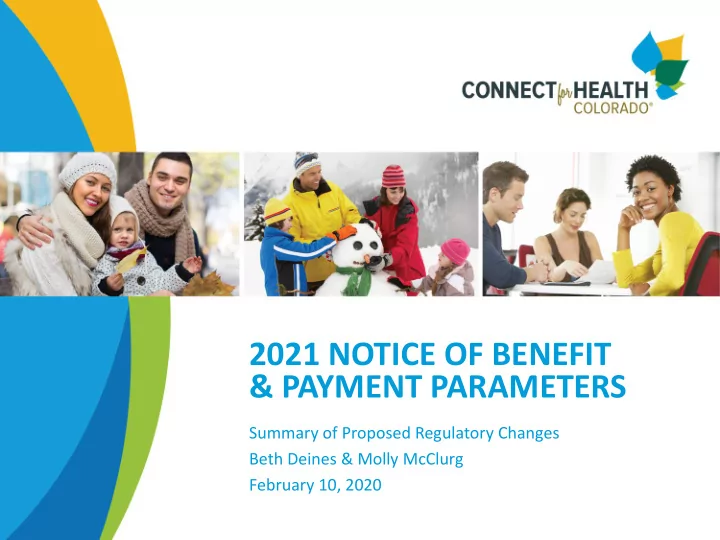

2021 NOTICE OF BENEFIT & PAYMENT PARAMETERS Summary of Proposed Regulatory Changes Beth Deines & Molly McClurg February 10, 2020
Notice and Comment Rulemaking January 31, 2020: Proposed Regulations released. March 2, 2020: Deadline for public comment submission. Regulations will be finalized after the agency has an opportunity to review and respond to comments that are material to the proposal. 2
Proposed Changes to Special Enrollment Periods (SEPs) Special Enrollment Period (SEP) proposed changes: • Shortening the time between plan selection during a Special Enrollment Period and when the plan takes effect, resulting in more generous effective dates. • Updated binder payment rule that provides consumers who have an SEP with a retroactive effective date the option to pay one month’s premium and only receive prospective coverage. • Current rule only allows for moving the effective date up by one month and requires payment of all retroactive premiums, minus that month. 3
Proposed Changes to SEPs, cont. • Changes to metal tier limitations: • Silver-level enrollees who lose eligibility for Cost-Sharing Reductions (CSRs) may now choose a plan that is one metal level higher or lower, which is more generous than current rules. • Clarifications on the application of existing limitations to household members. • Inclusion of non-calendar year losses of a Qualified Small Employer Health Reimbursement Arrangement (QSEHRA) in the existing Special Enrollment Period for loss of Minimum Essential Coverage (MEC). 4
Automatic Re-enrollment (Auto-renew) Currently, individuals who qualify for $0 net premium plans are automatically reenrolled in the same manner as all other enrollees. • Under the proposed rule, these individuals would be reenrolled in the same Qualified Health Plan (QHP), but without the application of some or all of their Advanced Premium Tax Credits (APTCs) if they do not seek a full redetermination of eligibility during the Open Enrollment Period. • This means that even if a consumer’s income qualified them for a $0 plan, they could be reenrolled in the plan and responsible for paying the full premium (or some reduced amount). 5
Auto-renew, cont. • If finalized as proposed, this change will be highly disruptive for the most vulnerable enrollees. It will also be burdensome for Exchanges to accommodate this additional regulatory complexity, and result in increased confusion and cost for both Exchanges and Carriers. • Our comment will oppose these changes generally, and specifically favor flexibility for State-based Exchanges to decide how they should implement automatic reenrollment. 6
QUESTIONS? 7
Recommend
More recommend